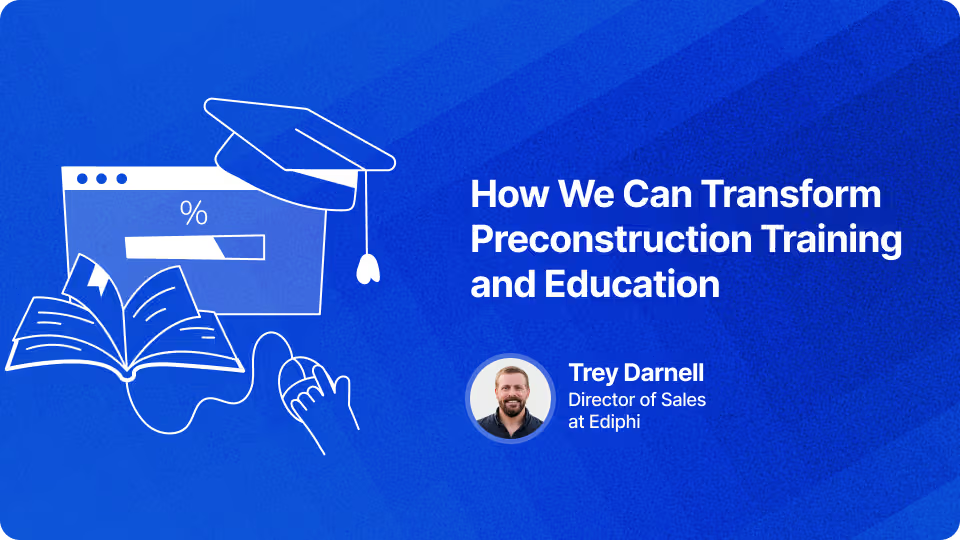
November 19, 2025


Our CTO at Ediphi, Michael Navarro, often says he got into precon because it sets the tone for everything else.
And he’s right.
In construction, everything flows downstream from the decisions we make in preconstruction.
If we want successful projects, we need successful precon.
But, in many ways, the way we are preparing the next generation of preconstruction professionals falls short.
How can we expect different outcomes from projects when we keep using the same approach to developing the people running them?
How can we transform preconstruction without first transforming how we train preconstruction leaders?
When I graduated from Auburn’s building science program back in 2010, I left with an amazing education: a general construction degree that gave me exposure to project management, a bit of BIM and VDC, and some estimating.
But that was a decade ago; when projects were simpler and project teams wore many hats.
Successful delivery today depends on clearly defined roles, deeper expertise, and stronger collaboration across specialties.
The generalist model does not carve out distinct swim lanes. And while project management and BIM/VDC are starting to find theirs, preconstruction is the one most often overlooked, despite the fact that so many of a project's outcomes are determined in this phase.
At the same time, the industry is facing pressure from all sides.
Material costs. Labor shortages. Tariffs.
Problems created by people that need to be solved by people, properly educated in project planning and equipped with the right tools.
It is not that new talent is not coming in. It is that they are not seeing precon as an exciting or obvious option.
And that is because we have not shown them that preconstruction is a dynamic, relationship-driven, modern field where they can make a meaningful impact.
This is the gap. Most construction management programs do a great job offering a well-rounded education, but they do not always provide clear visibility into industry-defined roles or the practical skills needed to thrive in them — especially in precon. Without that clarity, students overlook options that will improve the industry.
Academia has the chance to set the table earlier, in undergrad, by showing students what modern precon is, why it matters, and how it connects to the business of building.
But how?
A Better Way Forward: Clearer Pathways and Connected Tools
This is where connected tools play an important supporting role. Done right, they enhance curriculum by giving students visibility into how modern teams actually work.
Cloud-based preconstruction platforms allow students to:
Which rolls right into how junior estimators develop in their real world roles.
Instead of learning in isolated assignments, students see the full picture in one spot: how builders, designers, owners, and trade partners align to move a project forward.
Preconstruction suddenly becomes more than spreadsheets.
It becomes strategy, communication, and storytelling through a holistic picture of cost and scope. And when students experience this with the right tools supporting the lessons, they gain the clarity and confidence the industry has been missing.
Modern tools don’t change what educators teach. They simply make the learning real, helping students connect their studies to how projects actually come to life.
This isn’t about fixing hiring pipelines. It’s about strengthening the entire foundation the built world stands on.
Just like any structure, if the foundation is not solid, everything downstream is harder to align. That is why we have to look upstream - at how we are educating the next generation and shaping the talent pipeline with cloud-based software before they ever reach the office or jobsite.
If you’re interested in building better programming, in the classroom or on your team of junior estimators, let’s keep the conversation going.
Connect with me on LinkedIn or request a demo of Ediphi directly and I’ll show you how it works!